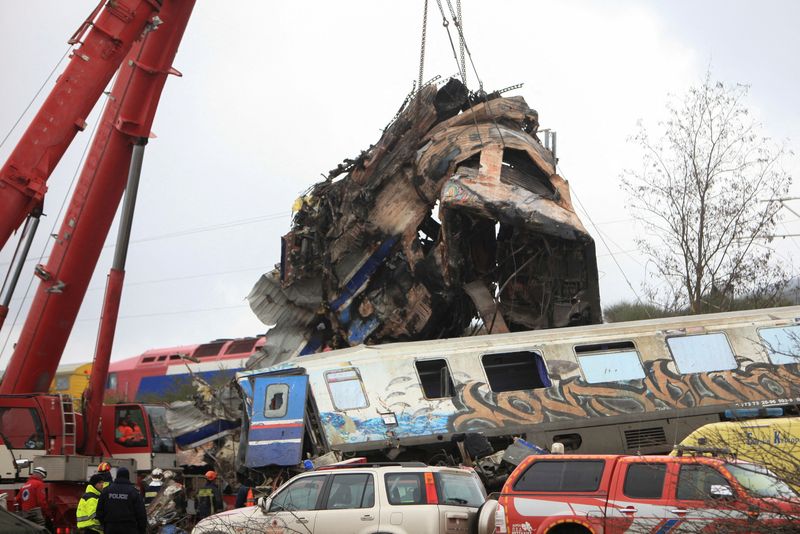ATHENS (Reuters) - The station master of Greece's Larissa city, who was charged on Thursday over the country's worst train crash, assumes some responsibility for the disaster but other factors were also at play, his lawyer said.
On Tuesday evening, a passenger train with more than 350 people on board collided head-on with a freight train near the city of Larissa, some 220 miles north of the capital Athens. The trains were travelling in opposite directions on the same track.
The 59-year old station master was arrested hours later.
Greek railway unions have long complained of slipping safety standards which place both passengers and workers at risk.
The detainee, who according to Greek state media reports was assigned his role about a month ago, appeared before a prosecutor on Thursday morning. Felony charges were laid against him for disrupting transport and putting lives at risk, his lawyer Stefanos Pantzartzidis said outside the courthouse.
"He is literally devastated," Pantzartzidis told reporters. "Since the first moment, he has assumed responsibility proportionate to him ... he is not in a position to say anything else."
Pantzartzidis said that his client followed the existing procedure partially and he could have been "possibly more careful, which he accepts and takes responsibility for, but until there". He added that "there has been convergent negligence by many other factors".
Pantzartzidis did not specify which factors he believed were at play in the accident or give details about what procedures his client had not followed. Authorities have not made public the name of the accused.
The man, who according to a police official had initially denied wrongdoing, attributing the incident to a technical failure, was expected to respond to the charges on Saturday.
A retired train driver instructor, Nikos Tsouridis, told state TV earlier on Thursday that the station master was trained but inexperienced.
"They will pile everything on the station master. He was trained, but inexperienced. They should never have assigned him to a central station like Larissa, and on his own."
"He had completed his training, but he had been there (in that position) for a month."
Greece's railway is functional mainly because of the trained drivers and station masters, Tsouridis said.
"The railroad only works today because of the drivers, because they are well trained, and staff," he said. Pantsartzidis did not say how long his client had been in the job in Larissa, one of the largest cities in Greece.
"PASS THE RED SIGNAL"
A recording of the communication between the train driver and the station master which was published on Proto Thema website suggested the latter told the driver to continue past a red signal.
"Is Larissa listening?" the driver said referring to the station master, according to the recording.
"It is listening... pass the red signal at the exit until the entrance signal at Neoi Poroi (station)," the station master responded.
But that order did not strike the driver as strange as the signalling system had been dysfunctional, Proto Thema reported.
Station masters are hired by OSE, the Greek railway infrastructure operator, while train drivers are hired by Hellenic Train, a subsidiary of Italy's Ferrovie dello Stato Italiane.

Earlier on Thursday, government spokesman Giannis Oikonomou said "the station master had confessed to negligence" and that the train crash was caused by a human error.
But Greece, he said, also needs to examine what could have been done over the years to prevent this crash.